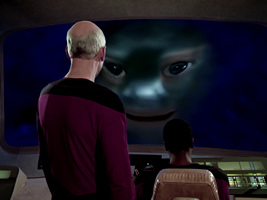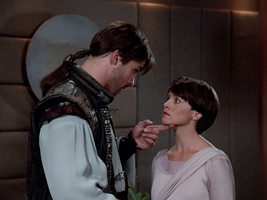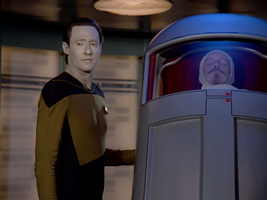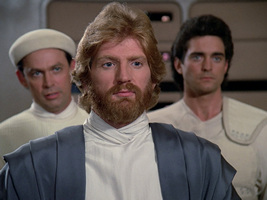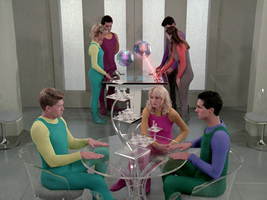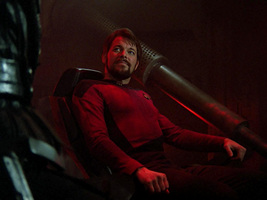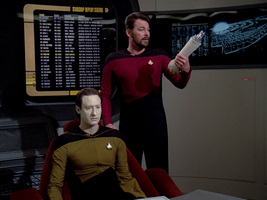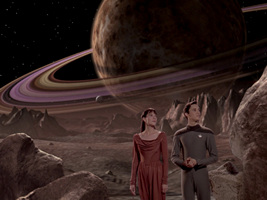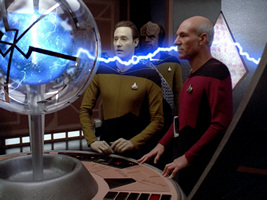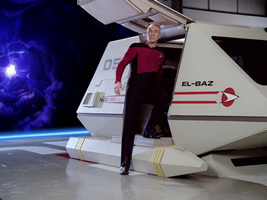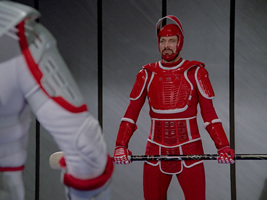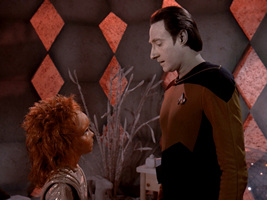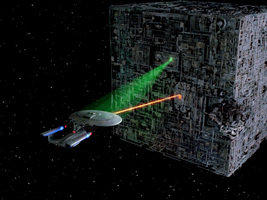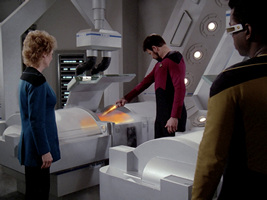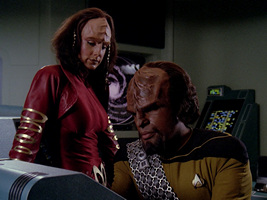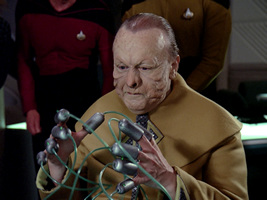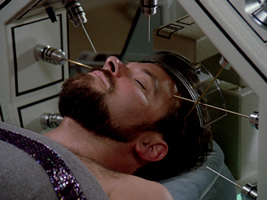The Next Generation (TNG) Season 2 Guest Reviews
Season 1Season 2Season 3Season 4Season 5Season 6Season 7
The Child
Synopsis
Stardate 42073.1: Synopsis in main TNG listing
Commentary
This episode is quite a favourite of mine for various reasons. First of all it gives Marina Sirtis some very emotional scenes to play (the birth of her son and his later death). It is nice to see that Deanna finally gets a bit more to do than telling Picard that someone is hiding something. The next positive aspect is the new doctor. I know that many fans loathe Dr. Pulaski and I agree her quarrels with Data and her fear of the transporter reminds one very much of our good old Doctor McCoy. Nevertheless, she is introduced as a strong character, overriding protocol to speak with Deanna about her unusual pregnancy when she is supposed to report to Picard and making it clear to Worf that sickbay is her domain. The introduction of Whoopi Goldberg as Guinan is very carefully handled and subtle enough. The other plot line of the episode with the transport of the deadly virus specimens is a bit unremarkable but it is nice to see that Geordi finally has a position that fits his character a lot better in my view. One thing that I disliked was Riker's first reaction to Deanna's pregnancy. He was reacting more than jealous... had they not already broken up and were just friends? But this is just a minor letdown in an otherwise very nice season opener.
Annotations
- Remarkable scene: The opening scene with the Enterprise and the Repulse was great, also the shuttlecraft leaving the shuttlebay. The music for that scene was also very nice.
- Remarkable station: The Regula 1 lab is re-used as Science Station Tango Sierra.
Rating: 7 (Timm)
The Child
Synopsis
Stardate 42073.1: Synopsis in main TNG listing
Commentary
I can't believe this episode was penned by three people, it certainly didn't seem like it required that many people for two very simple stories. Deanna being impregnated by a space borne life form and the Enterprise transporting a collection of hazardous specimens of a virus. The two stories intertwine when the child Deanna bore was the reason for a virus mutating and threatening the ship, dies and leaves, explaining via thoughts to Deanna it was looking to experience human life. Not very original. And I didn't like this episode even further thanks to the introduction of the obnoxious Dr Pulaski. Gates McFadden was fired from the series at the conclusion of Season 1, and in an effort to no doubt continue in vain to replicate all that was iconic about The Original Series, this old, arrogant bigoted woman was brought in as a replacement. I can't fathom why really, reading on Memory Alpha it was supposed to 'shake up' the camaraderie of the crew. Why? I'm amazed such a thing was allowed considering Roddenberry didn't want conflict between the main cast, so what was the point? I never liked the character at all and she does her best to exemplify why here, showing clear technophobia and a complete lack of tact, dismissing Data for his correcting the pronunciation of his name that she got wrong, and then ignoring his volunteering to assist Deanna in her childbirth. I was glad Deanna was only happy for Data to be there, but this so called Doctor was anything but professional or a reflection of the time in which her character existed. It reminded me of Will Smith's character in the film adaptation of 'I, Robot', of a Detective in his 30's living in Chicago in the 2030's, yet spurning the advances in technology in the field of robotics. It's hypocritical that such a character would kindly take to all the comforts 24th century technology had to offer (except the transporter in another shameless rehash of McCoy's characteristics), yet take any opportunity to display their bigotry at a being who only wishes to serve in its full capacity and who is not hurting anyone in the process. Pulaski's failure to report to the Captain as soon as she was aboard was also rude, I doubt her timing on coming aboard was so perfectly synched with Deanna waking and discovering herself to be pregnant, and Pulaski's insubordination is forgotten after that too.
At least some good came from the episode, Riker grows his beard, it's established now that Geordi has been promoted to Lieutenant and Chief Engineer, and Worf is now head of Security, Guinan is also present and for a change Wil Wheaton as Wesley didn't make me want to choke someone. Some of the direction was quite nice too, a few new camera angles (of the Enterprise too) and the lighting choices well matched the tone of Deanna's story.
Deanna's story though was hardly very interesting or emotionally involving, it was the kind of story that frankly NEEDED more time devoted to it so we could better get attached to the kid and feel the pain Deanna felt when he died/left, however the plot about the virus did have a fast pace so nothing of the sort about stretching to the story of the child could've been achieved in the episode.
So not the greatest episode alone for the fact that one of my most loathed characters in the franchise makes her first appearance, and as far as I'm concerned that appearance was one too many. This problem compounded by the episode just not being neither exciting or emotionally engaging for the respective story lines.
Rating: 4 (Cameron)
Where Silence Has Lease
Synopsis
Stardate 42193.6: The Enterprise is trapped in a void. Suddenly the sister ship USS Yamato appears, but it's only an illusion. The whole scenario is part of a plan of an alien named Nagilum, who wants to study human reactions to death. When Nagilum announces that it will kill half of the crew in deadly experiments, Picard orders the self-destruction. Just before the ship explodes, Nagilum interferes and says it has learned enough just by watching the crew's preparations to die and releases the ship.
Commentary
This for me is a standout episode in a more inconsistent season than most. Worf spends a full 45 minutes suffering from the Klingon equivalent of hypertension after an impressive holodeck combat simulation that opens the episode. Picard, facing the gruesome prospect of a third of his crew being killed in an imaginative variety of ways by a giant face in an eerie purple haze in space. The tension is geared up from the moment the void in space envelops the Enterprise. A calm crew tries to escape, but when a subspace beacon signal gets louder even though the ship is traveling away from it, the atmosphere changes. The easy destruction of a fabricated Romulan Warbird convince Picard that all is not what it seems, before the timely appearance of what appears to be the Enterprise D's sister ship, the Yamato. Riker and Worf beam over only to find an eerily echoey abandoned ship and they meet on the bridge, but the turbolift door opens to another bridge, leading Worf to lose his cool. The two beam back to the Enterprise, Picard orders full stop and an imposing green face appears on the main viewer, explaining the purpose of trapping the Enterprise. In a move that Janeway would later do every episode of the first season, Picard engages the self-destruct sequence only to abort it once the ship is released.
This, with "Contagion", "Time Squared" and "Q Who", remains one of the best four episodes of a series still unsure of its identity.
Annotations
- Unfortunate death: The helmsman is wearing a red shirt. Therefore he dies, practically sucking his thumb. Cause of death? Indigestion by the looks of it.
- Remarkable quote: "As the rat said, 'You can keep the cheese, I just want out of the trap.'" -Geordi reverting to his cheesy season one persona
- Remarkable quote: "A simple 'yes' would have sufficed, Number One." -Picard to Riker after deactivating the self-destruct
- Remarkable scene: Worf wrestling with a door because "a ship has one bridge."
- Remarkable ship: The USS Yamato. NCC 1305-E. Who would want to serve on her? Wrong registry, too many bridges, destroyed by a computer virus. Pretty unfortunate.
- Remarkable fact: Picard reverts to his rarely referenced French origins when facing death. Erik Satie's piano piece Gymnopédie #1 is playing in his quarters. Sacre bleu...
Rating: 9 (Luke Moore)
Where Silence Has Lease
Synopsis
Stardate not given: Synopsis in main TNG listing
Commentary
There are probably a lot of folk who may not be keen on this episode, but I like it.
The teaser is quite impressive - Worf and Riker having a holo kick up with a couple of gruesome beings, further hints to the build up of Worf's character/fan favourite.
It then takes a different tune to the crew discovering an "area" of featureless space - a dark fissure. After firing a number of probes into it, the Enterprise goes a little bit closer to check - only for it to envelope the ship.
From there on, the crew try to explore then escape this phenomenon in ways reminiscent of the classic Star Trek we know and love. They encounter a Romulan warship which is not only easily blasted but has no debris, then their sister ship the Yamato, where things start to get surreal to say the least with its multiple bridges and anywhere ending corridors. Then just as the away team is in crisis, an opportunity to escape is presented making Picard wince. Escape or leave his away team?
The crew have no idea what is going on until Pulaski surmises it from the facts; it comes across like a lab experiment. On cue the alien responsible comes to pass in the form of a giant green ballaclavered face.
This being is seen as first tolerable but swiftly its intentions become hostile and lethal: Nagilum the alien wants to understand DEATH. Crewman Haskell answers for it. Even worse, Nagilum plans to wipe out half the crew in the process for his experiments. Rather than let his crew become perverted playthings, Picard decides to destroy the ship and its crew.
Some say this maybe drastic, even contradictory but what is the viable alternative? How does one destroy a being that "doesn't exist", or beat them? Would anyone stand by and allow half their crew to be cruelly experimented - tortured on? Death is the sole choice, but let it be on their terms than its.
I like this episode because its adventure, it's Star Trek, it has humour, the story and unfolding plot makes sense, all the cast are used properly for this too - Pulaski's analysis, Deanna's empathy, Riker as the header on missions, Data's factual notes, Picard being the paced leader, Worf being the security man at its best, Geordi witty and thoughtful, and Wesley being a member of the crew.
In addition it has elements that make Star Trek what it is - the exploration angle, finding the unknown, dealing with the omnipotent, the unusual, and coming up with ways to get out of it - ones alas that are last resort or no choice.
This is CLASSIC Star Trek - think "The Immunity Syndrome", "The Doomsday Machine", "The Corbomite Maneuver", and "Arena". All adventure, no easy fix technobabble, character lead stories where the crew and ship act as one. Not the later rubbish of "rerouting power from life support to the shields" or "modifying the deflector array to emit a transphasic pulse".
Just Star Trek at what it does best. When I first saw this, I loved it and seeing it again has not weakened it. I would watch this again and again. Well acted, well paced, and humorous without being silly. Shame they did not do more episodes like this. 10/10.
Annotations
- Remarkable error: Data claims that the hole in space has never been encountered by any Federation ship - yet the original Enterprise encountered something like that in "The Immunity Syndrome". Ooops!
- Traditional death: Ensign Haskell - dies at the Conn station when Nagilum "kills" him, and was wearing red when he popped his clogs...
- Remarkable dialogue: "...Ten seconds to auto-destruct..." - "Captain..." - "Abort auto-destruct sequence." - "Riker, William T., do you concur?" - "Yes! Absolutely! I do indeed concur! Whole-heartedly!" - "Auto-destruct canceled." - "A simple 'yes' would have sufficed, Number One." - "I didn't want there to be any chance of a misunderstanding." -the computer, Picard, and Riker - makes me chuckle everytime - even reading it.
- Remarkable quote: "Captain, the most elementary and valuable statement in science, the beginning of wisdom, is 'I do not know.'" -Data
- Remarkable scene: Riker and Picard setting the auto destruct - the debate on time to give to "kill themselves" shows that this was a touch heavy burdened but only choice. Could just imagine what was going through their minds as the pulled the pin.
Rating: 10 (Chris S)
The Outrageous Okona
Synopsis
Stardate 42402.7: Synopsis in main TNG listing
Commentary
What a load of crap, both A and B stories were lousy, the A, about Okona and his womanising causing problems between two cultures, the culmination of which felt more like a soap opera with the respective 'Romeo and Juliet' like characters coming together after it seemed Okona was the cause of the problem, oh boring, boring, boring. The scenes with those characters just wasn't interesting nor were they well acted. The conflict between the planets not adequately addressed. Had the episode not wasted so much time with the crappy B-plot (which I'll get to), there could've been more information given on the warring societies and the fragile peace there was so at least there was a little more imperative to resolve the crisis. But that's not the case. Okona saw fit to whore his way around the ship and fraternise with the crew for too long with too little regard for his actions that is was only when pressed into leaving and risk capture did he decide to help out. So the parents of the lovers squabble a little more and piss off to their nameless, faceless society. Good riddance.
And Data's story about trying to better understand humour he turns to a comic (with a horrible mullet to boot) on the holodeck and listens to all his unfunny and outdated jokes. No wonder when he tries out the jokes on Guinan he's unsuccessful. At least Brent Spiner gave it his all, he switches from impersonating the obnoxious comic to the emotionless android perfectly.
A really dire episode otherwise however. It's pretty hard to get invested in Okona's story or see him in any other light than a selfish whore, his compromise plan comes too late to try and save the importance placed on ensuring peace is maintained between the two cultures involved. The less said about the B-Plot the better, it just wasn't needed as Data had been struggling to understand humour, yet his own naivety was still providing laughs for the audience and the crew alike.
Annotations
- Remarkably apt quote: "So... if you put funny teeth in your mouth, and jump around like an idiot, that is considered funny!" -Data (pull all the funny teeth reference and the same is still true)
Rating: 0 (Cameron)
The Outrageous Okona
Synopsis
Stardate 42402.7: Synopsis in main TNG listing
Commentary
In Season 2 the writers were still finding their way so different formats are excusable. But seeing if a soap opera was the right style for members of a Federation in which the social conventions on which soap operas are based are defunct was an unnecessary experiment. The marriage dispute, the stigma of Yanar's pregnancy and the theft of the jewel all seem rather quaint for the 24th century. It is possible that these issues are important to the inhabitants of the two worlds but if so the writers missed an opportunity to compare Federation values to these outdated worlds.
The dialogue, in which the characters of the week declaimed and announced their intentions highlighted the drama aspect of the episode. It was as if they were telling a story and the details needed to be made explicit for the viewers even if the characters themselves were already familiar with them. Consequently the plot seemed artificial and lacked subtlety. Data's subplot, whilst devoting much focus on his personality, was arbitrarily discrete from the main plot. Nevertheless it showed how focusing on individual characters could enrich the overall storyline. The moment when Data realised the holographic audience was programmed to laugh regardless of his abilities and deleted them was genuinely sad. It made me realise that even if he could not feel sad himself the viewer should still feel sad for him as it is part of the human experience to be able evoke feelings in others. Data certainly achieved this.
Finally, the behaviour of Okona's two conquests was irritating. These are career driven Starfleet officers and emancipated Federation women, and to find them both helplessly seduced and waiting passively for him in their quarters is inexplicable. All that was missing was some mild domestic violence followed by a romantic dinner and the soap opera theme would be complete.
Annotations
- Nitpicking: Okona's ship is surely too large for a single person to maintain.
- Observation: In hindsight Okona doesn't live up to his epithet. "The Misunderstood Okona" might be more apt.
Rating: 2 (Neil S)
The Schizoid Man
Synopsis
Stardate 42437.5: Synopsis in main TNG listing
Commentary
Thankfully, unlike "Datalore", this episode doesn't feature the senior crew spending the duration of the episode clueless to the blatant obviousness of Data being taken over by the consciousness of his creator's mentor. That alone I find rather unlikely, it's one thing to transfer knowledge, but to successfully transfer one's own subconsciousness, feelings, attitudes? Perhaps that's why Picard remarks on how incredible an achievement it was. The whole episode, riding on that premise did seem a little unoriginal in light of "Datalore", but my opinion really was changed in no small part to Patrick Stewart, and yet again Brent Spiner who is brilliant as Graves 'as Data'. Once again these two actors set the bar high and help make an otherwise average episode very entertaining, especially in the climax in engineering where Picard that what Graves is doing comes at too high a cost considering the injuries he had inflicted on others thanks to Data's enhanced strength.
And the episode is also nice in a small part to Suzie Plakson as Dr Selar. I've noted many times (and as Graves rightly points out) how lovely she is to look at, it's all a shame this is her only appearance in The Next Generation, as I would've happily welcomed her as the replacement for Crusher instead of being subject to that insufferable bitch Pulaski, who is only in the episode for 5 minutes and then has a line near the end over the comm. Yes, I think if Roddenberry wanted to again try and recreate part of TOS on TNG, having a Vulcan may have been a smarter move than the grating, unappealing personality of Pulaski.
Rating: 6 (Cameron)
The Schizoid Man
Synopsis
Stardate 42437.5: Dying scientist dumps his mind into Data.
Commentary
This episode was too slow in my opinion. At the beginning of the show it was revealed how Dr. Graves could transfer his mind to a computer, leaving us in suspense as to when it would happen. But right at that moment when Graves is talking to Data I just knew that the doctor was going to use Data. For the rest of the show I wondered, why can't the crew put two and two together? It could have been compressed into an Animated Series plot. However, the only worthwhile part was the funeral speech. Did Graves write that previously or was it impromptu?
Annotations
- Nitpicking: Have we ever seen a scientist that was NOT the preeminent scientist in his/her field?
- Remarkable quote: "I can safely say that to know him was to love him and to love him was to know him." -Data (or actually Graves)
Rating: 4 (Unitron6991)
Loud as a Whisper
Synopsis
Stardate 42477.2: Synopsis in main TNG listing
Commentary
The Enterprise helps to negotiate another conflict, yeah alright, again a guest character comes aboard and it impacts the crew. Riva himself, is kind of a jerk, a deaf-mute who speaks through 3 people whom he is telepathically linked too. This premise, was alright, but I felt giving them characteristics of his personality, emotionally speaking, was silly and reminded me way too much of the TV series 'Herman's Head' where likewise we were given an insight into the way a man's mind worked in that different actors portrayed different facets of his psyche.
And it makes me wonder even more about the arrangement, that 3 people over generations are chosen to abandon their own lives to speak and to feel for someone else? I don't get it, the concept is ok, but I think the execution was average. The story was surprising in what happens, with the chorus being killed whilst negotiations are attempted, and then Riva attempts to resolve the conflict, hoping to teach both sides of the conflict sign language to communicate both with Riva and each other. Perhaps it's the cynic in me talking, but the conclusion was leaving me less than optimistic, I can't imagine the people on the planet would've had the patience, and Riva was probably killed in a squabble. :)
Troi again annoys me, it seems like she spent only seconds in Riva's company before she accepted the attraction he felt towards her and reciprocated in kind, it was a very poor impression I thought, as if any random guest character has to wink at her and she's already swooning.
So I wasn't all too impressed here either, not a terribly bad episode, but once again, as is the case with early Next Generation, an episode not rising to anything above mediocrity.
Rating: 4 (Cameron)
Unnatural Selection
Synopsis
Stardate 42494.8: Synopsis in main TNG listing
Commentary
I picked the wrong episode to watch tired, such an uninspiring one with way too much technobabble and too little logic behind it. A bunch of genetically engineered humans cause non-engineered ones to rapidly age and die. Pulaski comes tantalisingly close to biting the bullet but in the grand tradition of cheesy Star Trek scripts the solution is found well after the audience has worked out how to solve the problem, which makes the crew look incompetent. It was as if there was a need to stretch out these episodes and it doesn't matter if the people we're watching end up looking completely oblivious to the solutions or not, the time it took for Pulaski to realise she could examine one of the genetically engineered children in a shuttle, not endangering the Enterprise at all, or the search for comparable DNA of said Doctor's lying in the most obvious place, her quarters. It makes me wonder if living in the ultimate age of convenience for the crew of the Enterprise severely inhibits their ability to think simply.
And technobabble, oh boy, it's highlighted below, I could barely catch up. It's yet another blight on not just this episode but what The Next Generation brought to Star Trek, an emphasis and reliance on all this gibberish. Unlike throughout the episode, where a quarantine beacon is placed on the Lantree and the warning is sounded, or Picard going through these channels to send out messages or whatever, using technobabble is a hinderance. I enjoyed those examples which almost took me into that universe where what they were doing was hands on and relative to mundane practices, but using any number of doo-wacky's and thing-a-me-bobs to resolve a situation is aggravating and detracting, an ultimate 'Get out of jail card'.
Anyway, the episode, yeah, a little character development, shame it all comes as a result of hearsay though apparently Deanna has known both Pulaski and Picard long enough to give each of them advice on how to deal with one another, but it's nothing none of us could've determined anyway, Deanna just continues to feel like the most useless member of the crew next to Worf, as all she does is state the obvious. Pulaski is dedicated to her craft, but not to the point of losing her judgement, wow, she wouldn't have been a very good Doctor or Starfleet officer had that been the case, she certainly wouldn't have been transferred to the Enterprise, the Pride of Starfleet had she been incompetent. And of course Picard is dedicated to the well being of his ship and its crew, he's the Captain and that's his first duty. And further to that, Troi's lines about people being deceptive...it never really took a psychic to work that out with many of the nefarious characters so far, and the tradition goes on. So Troi tells Picard and Pulaski both these things, and the pair seem to reconcile at the episodes end after Picard beams a rejuvenated Pulaski back from the research station housing the children, content that both are of similar character and neither will really change.
I couldn't really care about the plight of the researchers as I found the whole idea of an immune system which causes people to rapidly age to be very far fetched even in the realms of science fiction. It just didn't seem to make alot of sense. And it does cause discontinuity as later in the series it's made clear genetic engineering is a crime in the 24th century and most likely was a very long time before that citing Khan as precedent. And the children themselves, one of them just stares at Pulaski and looks doe-eyed when she becomes infected, and the others are just on display in their isolation chamber that they're completely gone to waste, 'the future of humanity' Pulaski called them, ironic.
So on a whole, a poor episode, just not making a hell of alot of sense, the interaction between Picard and Pulaski was really of no consequence as both characters are so similar it's inevitable they will never become anything more (Pulaski isn't fit to wipe Picard's boots as it is), and as we all know, Pulaski wouldn't be hanging around for much longer anyway. The story isn't so bad that it isn't worth watching again, but only if there's nothing better on would I recommend it.
Annotations
- Remarkably infuriating technobabble: "Well, I'd have to get into the biofilter bus and patch in a molecular matrix reader. That's no problem. But the wave form modulator will be overloaded without the regeneration limiter in the first stage circuit." -Miles O'Brien
- Remarkable fact: Diana Muldaur felt so tired during the shooting of this episode and the use of extensive make-up that she promised this would be her last season and she would never act on science fiction again.
Rating: 3 (Cameron)
A Matter of Honor
Synopsis
Stardate not given: Synopsis in main TNG listing
Commentary
This episode is by no means a 'wow', but it has several positive aspects to it that are often overlooked. For one, this is the first time a Federation officer served on a Klingon ship. Just that idea is fascinating. But the episodes of Star Trek that shows us just how complicated characters and aliens are are the best. Klingons aren't just mindless, blood thirsty killers anymore. They laugh...who would've guessed?
Annotations
- Remarkable error: When Ensign Mendon sees the organism on the BoP, the concentration appears to be on the left side of the neck. When the Enterprise begins to repair the damage, the beam is concentrated on the right side of the neck.
- Remarkable quote: "Let them charge into their destruction!" (Captain of Klingon BoP referring to the Enterprise)
Rating: 6 (Norm)
A Matter of Honor
Synopsis
Stardate 42506.5: Riker is chosen by Starfleet to be in the first ever Starfleet-Klingon exchange program. Riker accepts and is posted aboard the Pagh, a Klingon Bird-of-Prey. While there, Riker enjoys a few laughs with the Klingons in their mess hall, but things become complicated when the Captain of the Pagh discovers a parasite eating the hull of the ship. On board the Enterprise, it is discovered that a new Benzite crew member knew of the parasite but didn't tell anyone because of standard Benzite etiquette. The Pagh then cloaks and plans to attack the Enterprise, but Riker is able to legally take command and end the confrontation. Riker then returns to the Enterprise and their mission continues.
Commentary
This episode was wonderful because it gave us more of an insight into the inner workings of a Klingon ship. I love how this episode shows and describes some Klingon food (yum). All of these foods seem pretty disgusting, but to Klingons they must taste pretty good. An interesting tidbit is that the targ is not only a Klingon pet, but its heart is also considered a delicacy.
I think that Riker does a good job handling the Klingons and how he stops the Klingons from firing on the Enterprise. I also think Jonathan Frakes did a good job acting in this segment to make this tale really come alive.
This is an interesting episode that really does shed some more light on Star Trek's most popular and well known aliens. It was well written and well directed and executed. It is a fun episode and a must watch for all Klingon lovers.
Annotations
- Gagh: gagh is live serpent worms and is best served live.
- Funny: The Klingon officers tell Riker that, if their food is to strong, they could get one of the females to breast-feed him.
- Rokeg blood pie: The props for the pies were actually red-dyed pumpkin pies with bottoms-up turnips. This is latter learned to be one of Worf's favorites.
- Cool ship: The IKS Pagh is cool, even if it is old, broken-down, and a little rusty.
Rating: 7 (Nathaniel Scripa)
A Matter Of Honor
Synopsis
Stardate not given: Synopsis in main TNG listing
Commentary
I like the idea of this episode and at the time it was a bold and clever one - to see what it would be like to be on a Klingon ship.
In this case, Riker accepts the idea of a officer exchange program and decides to serve aboard a Klingon vessel - after all, Worf serves on the Enterprise, so it seems 'fair'. After sampling their food and "understanding" their "Culture", he sets off.
Like I said I liked the idea - alas its inception was the beginning of the end of the Klingons as a race and started the trend of making them pub drunk thugs who like nothing more than beat the shit out of each other, drinking like fishes, and everything in their culture being dark, dingy, and dangerous.
Then the matter of how he becomes part of the crew; swearing death loyalty, smacking in the second in command to prove what a warrior he is, eating primitively, and all the predictable crap that is expected. This is embracing and understanding another race's culture....right....
His loyalty is put to the test when its discovered via the B plot, of an alien organism that is eating into their hull, and it only appeared after they met the Enterprise. Typically they think the Enterprise is the aggressor and want war.
The Enterprise intercepts them to warn and offer a solution, but there is so much bombastic clichés that killed my interest in this: "WHY DO THEY HAVE THEIR SHIELDS UP?!!!!" -Klingon Captain. "BECAUSE IT'S STANDARD PROCEEDURE!!" -Riker. "THEY WANT A FIGHT!!!" -Klingon Captain. "TELL ME THEIR SHIELD CODES!!!" - "NO!" - "IF YOU HAD YOU WOULD DIE A TRAITOR'S DEATH!!!" -Klingon Captain and Riker...
And so forth.
The B-plot is just putting a new green eared alien in his place - eager to impress but fails by his own self crapulence, but found the cause and how to treat the organism, but it's just Meh.
If they had made the Klingons a people and not a bombastic cliché, it would be better - however many naive F***ers think the Klingons are cool because of this!
In all seriousness though, can a race of drunken knife wielding, bad mannered, mullet haired beings REALLY make an empire - let alone technology? Exactly.
If you like Klingons - you are in a world of bliss - if not, like me, avoid.
3/10 for the concept - and I am being VERY generous.
Rating: 3 (Chris S)
The Measure of a Man
Synopsis
Stardate 42523.7: Synopsis in main TNG listing
Commentary
Brent Spiner's character "Data", for me, is the most fascinating, thought provoking character I've ever seen in a piece of televised fiction, scientific or otherwise. And as such an episode fully exploring the concept of what Data is, is he an "it" or an extremely sophisticated machine built to resemble a human man or another stage in Human or possibly Humanoid life. It's reasonable to assume that Dr. Soong created Data to fulfill the role of a human being (as the role of a son to love and not a tool to be exploited) and so therefore subject to laws and also protection as ruled by law, just like any sentient life form, so I find Maddox's comparison of Data refusing to undergo disassembly, being like the Enterprise computer refusing a refit not accurate. The differences between Data and the ship's computer are more than obvious, to quote Julian Bashir, "I dont know machines that grow hair". This episode has Gene Roddenberry all over it, the dialogue is extremely sharp, elegant and engaging. The regular characters more than pull their weight, Brent and Patrick do what they do best, complimenting each other's obvious character differences. I particularly liked the appointment of Riker as the voice of Maddox; it was far wiser than hiring another dull, spineless weasel looking to rock the boat. We genuinely feel for him having to force himself to condemn his fellow officer and friend, on the pain of Data's impending cybernetic oblivion if he appeared partial or half-hearted in any way. And would a race of Soong type androids be considered "property" under the pretext of their birth requiring the death of a sentient being be ethical? I believe all this would not achieve the desired outcome for Starfleet if Maddox was successful in both winning his case and replicating a race of Soong type androids, but only de-value life in general. Perhaps this race of sentient "slave" machine androids would rebel and reject servitude in exchange for the same rights as other species observed in the Galaxy..?
Plot nitpick: Why did Starfleet Academy accept Data's application to join their organization knowing full well in order to do so would confirm their belief that Data WAS a sentient life form?! Also a commissioned officer with rights should suddenly find himself without these rights because it's suddenly convenient for Starfleet?
Annotations
- Remarkable quotes:
- "Your Honour, the courtroom is crucible, in it we burn away irrelevancies until we are left with a pure substance, the truth, for all time!"
- "It sits there.. looking at me, and I don't know what it is. This case has dealt with metaphysics, with questions best left to saints and philosophers... Is Data a machine? Yes. Is Data Starfleet property? No. We've all been dancing around the basic issue, does Data have a soul? I don't know if he has.. I don't even know if I have! What's important is he's allowed the right to explore these questions just like anyone else has."
- Picard's final statement: This scene was very reminiscent of a TOS episode "Court-Martial" where the lawyer Samuel T. Cogley gave his final powerful statement in defence of Kirk concerning man vs machine.
- Remarkable prop: Data's left forearm when removed for inspection, moving slightly, sadly reminding Riker that it's not just a component from a machine.
Rating: 9 (kevan saeed)
The Measure of a Man
Synopsis
Stardate 42523.7: Synopsis in main TNG listing
Commentary
"The Measure of a Man" proves beyond a doubt that Star Trek transcends the genre and establishes that at times this franchise doesn't need to have an episode filled with special effects or space battles or wonderful aliens of the week to still be an exceptional episode. And once again Patrick Stewart shows he is a class above, as he is instructed to represent Data as a smarmy Commander hopes to reassign and disassemble the android for purposes yet to be made clear, but as a conversation with Guinan eludes to, the study of Data, and the creation of many more, could simply lead to a new age of slavery. Right thankfully prevails after Picard gives an impassioned speech about Data as an individual, and how he is no different from any other being despite the assertions of Commander Maddox, who quickly falls silent soon after Picard makes his point.
Though there's not much allotted to his role, Jonathan Frakes does a decent job displaying the conflict as he is given the task of prosecuting Data and upholding Starfleet's ruling that Data is the property of Starfleet. A shame a little more wasn't conceded with this part of the story, it would've been good to have seen Riker wrestling with his role a little more beyond a couple of glib expressions and his cross examination of Data, but it was still a convincing argument he gave.
All in all this episode takes us back to the heart of Star Trek, and as Picard rightfully pointed out, the discovery of new life, and more importantly: How humanity reacts to that life presented to us. Do we allow more controllable beings to explore their own fate, or try to assert our rights over it as humans, in some cases superior beings, and try and use that life form for our own needs. Thankfully, the ruling is that Data has the right to choose whether to participate in Maddox's experiment, which he obviously refuses, and the lessons learnt from our own past are learnt from.
Annotations
- Remarkable quote: "... Starfleet was founded to seek out new life - well, there it sits!" -Picard, in his summation
Rating: 9 (Cameron)
The Dauphin
Synopsis
Stardate not given: Synopsis in main TNG listing
Commentary
The first of many stories of doomed romance aboard the Enterprise - the ones done between a major cast crewmember and the resident visitor of the week, once again said person has a secret to not allow love to blossom and once again said crewmember breaks all the rules of one's Starfleet training to once again earn the annoyance/wrath of Picard. If you think about it, Starfleet and the Enterprise especially, is the greatest means of contraception and celibacy afloat!!
This is Uber prodigy and "most annoying character ever in Star Trek" Wesley Crusher's turn to get this treatment. It's the usual nonsense of alien "princess" who loves him BUT duty for her people gets in the way, coy love, overprotective aunt/bodyguard/whatever, commanding Picard ordering Wesley to keep away but doesn't, and the ending where the doomed love comes to pass.
I have no qualms with relationships, hell even crushes, but SO obvious? Considering that the US uses teams of writers, this is the best they could come up with?
Again another filler episode, with nothing new to say, and a lot to forget.
Annotations
- Remarkable dialogues:
- "Judging by her appearance, it is likely you and Salia are biologically compatible. Of course, there could be a difference in the histocompatibility complex in the cell membrane, but-" - "Data, I want to meet her. Not dissect her." -Data and Wesley
- "Worf, it sounds like it works great for the Klingons, but think I need to try something a little less... dangerous?" - "Go to her door. Beg like a Human." -Wesley taking courtship advice from Worf
- Remarkable fact: The term "Dauphin" is French for "dolphin" and was traditionally used as the title of the crown prince of the ancient regime. The female version was planned but appears lost in translation...
- Remarkable gaff: Doesn't anyone do their homework on beings they take aboard ship? I mean since they are "part" of the Federation, no one has ever experienced their allasomorphic abilities? Or warned people about them? Pfff.
Rating: 0 (Chris S)
Contagion
Synopsis
Stardate 42609.1: Synopsis in main TNG listing
Commentary
"Contagion" entertainingly mixes the right amount of mystery and action to make another enjoyable episode which also furthers the character of Picard as his passion for archaeology is revealed after the discovery of cross-galactic Iconian gateways by a fellow Captain whose own Galaxy-class ship met its doom after being plagued by computer viruses after being scanned by an Iconian probe. The Enterprise nearly meets the same fate till Geordi comes up with yet another obvious solution which anyone with a computer today would've worked out long before: Perform a system restore to the point before problems started to arise. However that one problem wasn't enough for me not to enjoy this episode, it was very well paced and the score was good. The appearance of the Romulans was enjoyable and I am a big fan of the design of the 24th century Romulan Warbird, a beautiful yet fear-imposing vessel. And the background of the Iconians is rather intriguing, a civilisation which existed hundreds of thousands of years prior to the setting of the series which used its doorway technology to cross great distances and conquer other societies. They'll be mentioned again in Deep Space Nine episode "To the Death".
A fun episode, well written, well paced.
Rating: 7 (Cameron)
Contagion
Synopsis
Stardate not given: Synopsis in main TNG listing
Commentary
A straightforward, simple no nonsense episode that I make time for again and again.
Its starts off as a tragedy when the sister ship of the Enterprise, the Yamato explodes - it's assumed that it's a design flaw, until a Warbird of the Romulans appears and the crew believe it to be they who committed the destruction of the Yamato.
It is finally discovered that its a virus from a race long extinct called the Iconians transmitted by probes that result in their sister ship being destroyed.
It's simple, not over the top interstellar exploration, encountering alien tech from races long gone - true interstellar archeology. The events with the Romulans add a nice flavour of drama and action. The solution is brilliantly simple - reboot everything - strange that Star Fleet ships are not fitted with Anti-Virus software ;)
A good episode with good pace, and plot.
Rating: 8 (Chris S)
Time Squared
Synopsis
Stardate 42679.2: The Enterprise encounters a shuttle from their own ship tumbling lifelessly in space with an unusual passenger, a duplicate of Captain Picard. Through a little digging Geordi and Data discover that the shuttle is from six hours in the future. They also recover a few images from the shuttles last moments that show the Enterprise not only being caught in an energy vortex, but being completely destroyed. Picard decides to continue on their course and try to get more information from the other Picard. As the time to zero hour begins to diminish, the other Picard becomes more coherent just as an energy vortex opens up under the Enterprise. As the seemingly life-driven vortex begins to shift its attention away from the Enterprise towards Picard himself, the duplicate Picard wants to get back in the shuttle and leave to give the Enterprise a chance to break free and escape. At the last minute, the real Picard discovers from his duplicate that another (and only) other option is to fly directly into the vortex. Picard then kills his duplicate with a phaser in the shuttlebay and orders the ship to fly into the center of the vortex. The ship does and escapes just as the now dead duplicate Picard and his shuttle vanish.
Commentary
This episode did a good job incorporating a time travel premise without using many years as the difference in the two times. It was an interesting idea to make the time differential only six hours and not using the old "screwed up timelines" approach. The filming was excellent in the sense that they managed to film two Picards in the same picture rather well, although in a few shots, it is easy to tell that the other Picard was Patrick Stewart's photo double. I like Picard's idea that the crew shouldn't second guess themselves and should proceed as they normally would. That is the true sign of a good leader.
Picard was rather upset at seeing his duplicate on his ship. Troi thought this was because he represented doubt, but I think he was upset with "himself" for leaving the ship in a time of crisis, as this is how I would feel if I was in Picard's situation.
On the trivia side, this was originally supposed to be a Q story in which in a later episode it would be revealed that Q was responsible for the whole incident, bet Gene Roddenberry nixed that idea.
I love this episode as it is one of my favorites and was probably one of the best episodes in the relatively weak second season due to the writers' strike. Overall this is a good episode that was well written, enjoyable, and flows nicely.
Annotations
- Shuttlepod: This episode marked the first appearance of the Type-15 shuttlepod. It was designed as a cheaper alternative to the full-sized shuttlecraft. The shuttle's name was the El-Baz, named after a NASA scientist.
- Phaser safety: Yet again it is evident that not only are phasers unguarded on the Enterprise and easily obtained, but are found almost everywhere, including the shuttlebay.
- Cool FX: The energy vortex was cool as was the sequence depicting the destruction of the Enterprise.
Rating: 8 (Nathaniel Scripa)
The Icarus Factor
Synopsis
Stardate 42686.4: Synopsis in main TNG listing
Commentary
First off, Riker's dad and Pulaski? EWWWW...Ok well the episode frankly was bad, I suppose it has a couple of nice themes about human behavior but none of that really comes into play as Riker and his dad just bicker for the duration of the story, set against the backdrop of Riker considering a promotion and the captaincy of the Aries, till the squabble culminates in one of the most ridiculous looking sporting contests I've seen. Anbo-jitsu. Some pseudo-Japanese, 'Gladiator' type battle complete with atrociously fake looking protective gear, and rules that make little sense. There's no point dwelling on it further, but suffice to say in a episode like this, it's little surprise this is what manages to bring the pair to reconcile in record time. The execution was just appalling, the Riker and his father argue, Riker shouts that he wishes it was his father who died early in his childhood instead of his mother, Riker's father professes his love for his wife, the two knock each other about a bit, Riker's father admits he had cheated in order to win these fights for a long time, but the pair suddenly connect and Riker admits his happiness over his father's visit.
Yeah right. It was bad enough with Riker spending the episode acting like a moody teen, maybe I'm not in the best position to talk, not having been raised as Riker may have been but the main was old enough by now to have acted with a little more maturity befitting of an officer who had been offered command of his very own ship. Petty behavior from both Riker's really, his father, despite his good intentions, did aggravate the situation as well at times, so like father, like son.
The B-plot focuses on Worf's alienation from the crew due to his heritage, as Wesley, the annoyance, discovers that the day the episode takes place over is the 10th anniversary of Worf's Age of Ascension, and as such a ceremony is programmed on the holodeck to carry out proceedings. I liked this bit a little more than the main plot, it did allow Worf to have a couple of different lines, and he has a chat with Riker too hoping for a transfer in the event of a battle arising. I think Worf has gotten TOO comfortable on the Enterprise and was looking for a reason to escape.
But both officers manage to get what they want, Worf is grateful for the ceremony, and Riker decides to stay on board after his miraculously quick reconciliation which I didn't buy at all. A little bit of development for both characters gets a couple of points.
Rating: 2 (Cameron)
The Icarus Factor
Synopsis
Stardate not given: Synopsis in main TNG listing
Commentary
This episode is a fine example of character development that is natural and unforced. The viewer isn't given all the facts beforehand as in soap operas. Instead, Riker and Worf act as they feel. This enhances the storyline whilst allowing the viewer to use their imaginations and empathize with the characters.
Like Picard, Will's father is another example of how a talented individual can go far in the Federation but at the risk of alienation from loved ones. In a Federation purportedly free of pain and suffering it shows the importance of making right decisions where people are concerned. Pulaski's reminiscences with Will's father and the efforts of Wesley and La Forge to help Worf show that the crew are not islands in themselves but dependent on one another. This adds tension to dangerous situations that arise since it creates the sense that characters may have other things on their minds. Pulaski's banter with Will's father reveals her natural instinct to help the injured, and this does much to enhance her character. Though not as complicated as Dr Crusher I liked Dr Pulaski as a model citizen and officer. In the absence of an episode focusing on her life brief clips such as this will have to do. The resolution of Riker's trouble with his father was original if somewhat violent, as was Worf's. I'm not sure if the moral message was that one could solve family problems through pain, but it was still a pleasant surprise to the 'touchy feely' alternative I expected.
Rating: 8 (Neil S)
Pen Pals
Synopsis
Stardate 42695.3: Synopsis in main TNG listing
Commentary
It almost seems appropriate that to offset the heavy discussions of whether the Enterprise should violate the Prime Directive in order to assist a planet facing destruction after a child on said planet had contacted the Enterprise via radio, is the heart of the story as provided by Data, who answered the young girl's transmissions. I liked the one seen with all the senior staff gathered discussing if they should assist or not, the discussion was intelligent and the timing well directed.
In the end it's decided that the Enterprise can't ignore its duty to the preservation of life, a moral decision, and the planet is saved. The young girl who contacted Data and was brought on board the Enterprise has her memories wiped.
As much as I had to admit it, Wesley's story, while quite unlikely, was quite easy to understand, as he's put in charge of a team in order to investigate the causes of the geological instabilities causing the destructions of the many planets. Wesley rightfully points out as nothing but an acting Ensign and a young one at that, it would be difficult for the people under his 'command' to take him seriously. Again though, common sense prevails and the officers take his orders without question. I was anticipating one of those predictable scenes where a smarmy Starfleet officer refuses orders and Wesley the wunderkind uses his superpowers to set him right, but it doesn't come to that.
That plot ties into Enterprises saving the planet on which the young girl lives. Good episode about the Prime Directive with some real heart in it.
Annotations
- Remarkable appearance: A very young Nikki Cox played the young alien Sarjenka, you may recognise her, or more likely her chest, most recently from TV show 'Las Vegas'.
Rating: 6 (Cameron)
Pen Pals
Synopsis
Stardate 42695.3: Synopsis in main TNG listing
Commentary
A truely great episode with hard issues at the viewers' faces.
The Enterprise is on a survey mission, of which some of it is placed in Wesley's care. This forms the B plot of the episode. The main plot though is Data answering the call of a young girl in trouble. Data spends a number of weeks in contact with the girl before discovering that what had happened to a planet at the beginning of the episode is happening to her planet as well. Data meets with Picard in the holodeck and tells him what he has done, but that the girl is unaware of interstellar life which is a breach of the Prime Directive. Picard calls for a meeting of the senior staff as well as ordering the communication between Data and Sarjenka - the girl - to cease.
The meeting that follows is one of the great underrated moments in Trek history. Worf and Riker both argue that they should not interfere, and Data, Pulaski, Geordi and Troi all argue in favor of saving the girl, her family and her people. Riker argues that it is a part of fate that the planet shall kill all life on it. Picard argues that the Prime Directive has many uses, and one of which is to protect the Federation itself. Eventually, Data realises that they will allow the people to die, and Picard orders him to sever the contact. Data then opens the com link and Picard's quarters are filled with static before Sarjenka's pleading voice fills the air. This makes Picard change his mind as he himself has heard the plea for help.
The B plot returns with Wesley once again saving the day with the results of scans he had had done - though this took a repeat of the order. Data, with Picard's blessing, tries to conduct Sarjenka and her family to a safer location, but he is unable to contact her. He goes straight to Picard and requests to transport down to Sarjenka's home to deliver the message in person - taking Picard's orders to the widest mark possible. Picard orders Riker to handle the transporter, and Data is beamed to the surface after Riker tells O'Brien to "take a nap" so he isn't involved in the plan - but "wakes up" so he can beam him back. Data meets Sarjenka in person, but discovers her family left without her. (Given the state of the planet that we see, her family could be dead or in an underground bunker). They both beam up to the Enterprise with data taking her to the bridge - much to Picard's anger. Special probes are fired and they stop the build up of dilithium which was causing the planetary disasters. Sarjenka is taken to Sickbay where her mind is wiped so that she remembers nothing of Data or her visit to the Enterprise. The episode ends with her lying asleep with a musical stone that Pulaski gives her.
Annotations
- Remarkable goof: When Wesley is pacing in front of the lab doors, they don't open when he gets close enough.
- Remarkable dialogues:
- "She is aware of interstellar life." - "No sir." - "Whoops." (Picard and Data)
- "Data's friend is going to die. That means something" - "To Data" - "Does that invalidate the emotion?" (Pulaski and Worf)
- Remarkable scene: The discussion of the Prime Directive
- Remarkable fact: Despite her dislike of Data as a person, Pulaski allies herself to Data when she counters Worf's statement of emotions during the discussion.
Rating: 10 (Robert Sharpe)
Q Who
Synopsis
Stardate not given: Synopsis in main TNG listing
Commentary
For most of the period of TNG up to this, it has been a dull experience and one of tedium. As J. Michael Straczynski, creator of Babylon 5, would put it - "its like having a Ferrari and just keeping it in the garage only to take it out to have an occasional trip".
This episode however was the equivalent of shaking Trek by the collars and giving it a good slap. Q, who I have always viewed as an annoyance, shone here - and with good reason - Picard's and his crew's arrogance compelled him into action which made the Federation meet their greatest adversary yet - the Borg.
Like with the fantastic "The Best of Both Worlds" here is what I wanted to see - action, tension, adventure, and a feeling of the unknown.
To me TNG was serving up drivel, with the usual hostage situation on some desolate colony, or some cack romance with one of the crew. This said no to that and went for what I think a lot of Trek fans want - exploration and encounters with the unusual and even the deadly.
Like with "The Doomsday Machine" it's simple but brilliant - a threat of omnipotent proportions - and the crew figuring out what to do to win. From the moment that the first Borg boarded the ship, you knew you were in for a treat - you knew that the smugness of the self assured Starfleet crew was being eroded to basic human fear as they faced an enemy better than them.
When they fought they knew they were on a losing streak, and to me that is the appeal - too many times Star Fleet wins, outclasses, and succeeds - here they were doomed - and to live, Picard literally had to beg Q to save them.
That must have been so galling!
But here, and the rare case in Sci-Fi - there are dangers in space we cannot beat all the time, or if at all. I am pleased that TNG had the balls - albeit rare is the occasion - to show them. The script between Q and Picard is a rare gem - well delivered and well meant!
I put it down to the fact that Gene took the courage to do that - since his death, it has never been the same and it would show in future episodes.
An episode I would gladly watch again and again because you knew what this was leading to...
Annotations
- Remarkable dialogues:
- "Interesting, isn't it? Not a he, not a she, not like anything you've ever seen before. An enhanced humanoid." -Q, describing a Borg drone to Picard
- "Why?" - "Why? Why, to give you a taste of your future, a preview of things to come. Con permiso, capitan? The hall is rented, the orchestra engaged. It's time to see if you can dance." -Riker and Q, before Q leaves after sending the Enterprise to J-25
- "Q...end this." - "Moi? What makes you think I'm either inclined or capable to terminate this encounter?" - "If we all die here, now, you will not be able to gloat. You wanted to frighten us. We're frightened. You wanted to show us we were inadequate. For the moment, I grant that. You wanted me to say 'I need you.'? I NEED you!" -Picard, Q about the pursuing Borg
- "You judge yourselves against the pitiful adversaries you've encountered so far: the Romulans, the Klingons. They're nothing compared to what's waiting." -Q to Picard in Ten Forward
- "That was a difficult admission. Another man would have been humiliated to say those words. Another man would have rather died than ask for help." - "I understand what you've done here, Q, but I think the lesson could've been learned without the loss of 18 members of my crew." - "If you can't take a little bloody nose, maybe you ought to go back home and crawl under your bed. It's not safe out here. It's wondrous, with treasures to satiate desires, both subtle and gross. But it's not for the timid." -Q and Picard
- Remarkable gaff: "We mean you no harm. Do you understand me?" - Picard: "'Understand you'? You're nothing to him." - Q: "Er don't you mean 'it'?"
Rating: 10 (Chris)
Up the Long Ladder
Synopsis
Stardate not given: Synopsis in main TNG listing
Commentary
CORRRRRRRRRRRRRRRRRRRRRRRRR BLIMEY!!! EM OIRISH YER KNOW!!! SHANNON! SHANNON! YER A CORKER SHANNON!!! BEGORRRRRRRRRRAHHHHHHHHHHHHHHHHHHH!!!!!
Not as bad as Tom Cruise's Orish accent in Far and Away, but very VERY close.
The idea behind the story is about immigration, that immigrants are seen as alien, a threat to society but in time will be beneficial and prosper said society in the long run. Sounds fine.
The problem is that the story was delivered with the subtlety of a rocket propelled battering ram landing into a china shop with equal grace and thought. The entire story was not just clichéd, but also insulting - the immigrants were not made out to be Irish bumkinds - THEY ARE OIRISH BUMKINS!! All the clichés of the folk from the Emerald Isle where here in stereo; goats in tow, feisty but sexy daughter, annoying brats, Bumkin Pa, - you get the idea. They had to be hauled off world for some reason I could not care or remember and had nowhere to go, but by sheer convenience there was a utopia not far with a dwindling population; the kind of folk who were way up their own buttocks.
Cue the two societies meeting, much mirth and panto thrown in, and at the end of the day they come to some mutual agreement etc etc etc...
I saw this episode when it came out and watched it and winced galore - this was not bad - this was an atrocity. I mean - Oirish country BUMKINS!?!? WHAT THE HELL WERE THEY THINKING WHEN THEY WERE DOING THIS!!!?!?!?!?!?
Had they thought this out, used aliens or something else, them it may not have been a bad episode - infact the subject is an important one - but the entire thing was handled with the skill of accident prone detonator makers in a nuclear missile factory.
Needless to say it backfired spectacularly; this episode is up there with "Spock's Brain" and "Star Trek V: The Final Frontier".
Annotations
- Remarkable facts:
- Melinda Snodgrass wanted to do the episode about Immigration and a critique on the way the US vetted migrants - she sold the idea to her boss about them being like Irish immigrants - alas he took her literally!
- The episode got a massive backlash from the Irish American Community for racial stereotyping. Ironically Melinda's boss - Maury Hurley, is an Irish American - and leads the St. Patrick Parade!
- Melinda also got slated for the murdering of the clones by the Pro Life lobby, Despite efforts to point out the contrary.
- Ronald D. Moore called this episode - "Embarrassing."
- Possible theory: There is a moment in this episode where Picard is so lost for words he chuckles - was that part of the script - or was it down to the fact he could not believe how bad things have got in the franchise?
Rating: 0 (Chris)
The Emissary
Synopsis
Stardate not given: Synopsis in main TNG listing
Commentary
Like so many episodes back in the days of early TNG, this starts with promise and ends in obvious - and watching it years later, this like most of TNG, DS9 and VOY, only emphasise the point by how outdated it all is.
It starts with the Enterprise being diverted in secret by Starfleet to rendezvous with a specialist who will debrief the crew on what their top secret mission is about. The method of transport is ingenious but at the same time rather daft - the specialist is in a torpedo - unless I am VERY wrong, if I have read my tech manuals right, such a device cannot maintain warp for long - more to the point why not a shuttle? After all something fired this probe, and if they wanted to be discrete, something more mundane would not get a second look. An unusual method speaks volumes!
Anyhoo, the pod is beamed aboard and opened to reveal the expert - K'Ehleyr, a Klingon/human hybrid - and, surprise surprise, is an old flame of Worf's. Cue numerous "sexual tensions", after a holodeck battle they have sex (ON DUTY WTF!!!!!!!!!!), she turns down his marriage proposal, he's unhappy, his feelings interfering with his duties, and once again the wrath of Picard is earned.
Meantime the mission is that there is a Klingon ship coming out of hypersleep and it has been adrift for 92 years. Once they awake they will still think they are at war with the Federation and will strike nearby colonies. The advisor suggests that the ship should be destroyed; typically Picard objects and suggest reason. Cue again friction to the wisdom of Picard and the thoughts of the Emissary.
When they do find the ship, it ends in the typical Star Trek way we know, albeit via a rather clever stunt by Worf.
Whilst I give this episode plaudits for expanding Worf, and the interesting/sometimes humorous/well acted scenes between him and K'Ehleyr - the idea of them having sex during such an important mission is just so BAD TASTE (points knocked down from eight to five here)! Its a cringing thought; some will say this is Klingon practice - but this is a Federation vessel and no matter how the heart flutters, discipline and rules are to be adhered to. Its like making love during office hours!
The ending too could have been more ambitious, like the Klingon ship failed its life support and the crew all died, or it crashed, or that it ran into another Federation or Romulan vessel and all diplomacy is blown to hell; something! Instead the Philosophy of Trek - that peaceful means wins the day is enforced here. I have no qualms about that but sometimes life shows us that that is not always the case. Its a pity that Star Trek could not be so bold (hence the low score).
Rating: 3 (Chris S)
The Emissary
Synopsis
Stardate not given: Synopsis in main TNG listing
Commentary
This was a poorly written episode. The actors were blameless, but the failure to expand on either the Klingon war or Klingon nature reduced them to implausible 'aliens of the week.' The gimmicky way of getting K'Ehleyr to the Enterprise and the secrecy of the mission made little sense beyond a device to create suspense. Couldn't details of the mission not be sent by encrypted code? Why does a renegade attack by Klingons in an outdated warship have to be kept secret? An episode more like the "Balance of Terror", with the Enterprise trying to outwit the Klingons would have been better. I'll explore the character flaws of the 3 main characters in turn:
- K''Ehleyr''s reluctance to explore options, the way she simplifies the problem to a) Klingons will attack, b) the Enterprise will destroy them, and the way she refuses to explore the context of the Klingons' mission when Worf begins to speculate is simply incompetent - why send her in the first place if she's so useless? And even when she does co-operate (thanks to Worf easing her sexual frustration), her advice is essentially the same as before. If the writers had allowed her to give some inspiration to Worf, which would have led to his successful ruse, her presence would have not been a waste of a class 8 probe.
- Picard's playing for time and refusal to listen to K'Ehleyr's advice also borders on incompetence. Since there are no options to prevent the Klingons from being destroyed if they attack the Enterprise or killing themselves if they are disabled, why does he hold out for a deus ex machina? For Klingons, to die in combat would be glorious - something that is mentioned by K'Ehleyr to him. And by failing to listen to K'Ehleyr when she advises him to destroy the Klingon ship when it first appears is a mistake that would have jepopardised the colonies had Worf not come up with his risky bluff. That was incompetent, as cloaked, the ship could truly pose a threat to the colonies and the Enterprise. It is not like Picard to be so hesitant when the lives of Federation citizens and the safety of the ship are at risk, especially since killing the Klingons would have had no repercussions. If there was a vital reason for keeping the Klingons alive, then his reluctance to act might be justified.
- The changes in Worf's behaviour are poorly explained. First he is hostile to K'Ehleyr, and although they have had some history, why exactly he is unwilling to talk to her initially is unexplained. There is no indication they parted on bad terms, indeed K'Ehleyr said to him 'it wasn't as if we tried it and it didn't work - you never gave it a chance.' When he goes to the holodeck to relax he must have known she was in there - why did he go in if not to resolve their unfinished business? His intentions, and a possible change of heart are not even looked at. Perhaps his childish behaviour, such as bringing Data to the meeting with K'Ehleyr after their 'mating' can show some development for when he fell in love with Jadzia later in DS9 (though he was equally reticent then).
Annotations
- Nitpicking: When K'Ehleyr visits the holodeck the panel states 'simulation in progress,' before she selects the program - it must have been occupied.
- Remarkable manoeuvre: Picard ordered the Enterprise to 'overtake' the Klingon vessel in order to force it to decloak and drop to warp - with space being so large and three dimensional couldn't the Klingons choose another route, or move around the Enterprise? It's not as if the Enterprise is blocking the way in front like a fallen tree on a road. Firing on it with a low yield torpedo similar to Data's in "Redemption, Part II" would have exposed the ship and shown that confrontation was futile.
- Alternative strategy: Since the ship could be located through the cloak, Picard could have beamed the Klingons aboard in suspended animation (or suspended in the pattern buffer until the contemporary Klingon ship arrived).
Rating: 2 (Neil S)
Peak Performance
Synopsis
Stardate not given: Synopsis in main TNG listing
Commentary
Once again an interesting premise ruined by predictability and rehash. The crew are taken away to hone their fighting prowess following the encounter with the Borg.
However, its the means that make this a stinker - first, restart an old Federation starship with what they have on said vessel. How will that help them fight a threat like the Borg, which they know little about? Is it to test command skills? Surely Riker earned that with the numerous references how he "thrashed a Tholian ship", that he was inline to command the Aries, and such things.
Second the "evaluator" the Zakdorn Kolrami - another smug, odious character of the week - this one has clay slopped over his face and he minces - MINCES!! Kept on thinking of Mr Humpfrey out of Brit com 'Are you being served?'. In typical fashion, he alienates the crew, ensures the wrath of Picard, and in the end is shown to be another idiot that is the but of retribution and mockery. He is claimed to be a famed strategist in the Federation. Yeah right...
On that, the way Dr. Pulaski shoves Data into a match with Kolmari is really disgraceful - what gives her the right to do this? Her machine prejudice gains what? I found it insulting and she should have been given a bollocking instead of Data.
Why could they not have someone who cares about the crew? Listens and works with them? Why must virtually everyone who comes aboard cause trouble? With such lame writing from a team, no wonder the series struggled.
Only three things save this episode; the re-use of the Constellation class and its technology, and the fight.
Aside of that, this episode is irrelevant.
Annotations
- Remarkable quote: "It is possible to commit no mistakes and still lose. That is not a weakness, that is life." - Picard. Well said sir, pity many do not heed this advice. Point 1.
- Remarkable scene: The battle - the Hathaway firing, only time we ever see a Constellation class DO something, the arrival of the Romulan Warbird, and the Ferengi attack. Excellent SFX. Point 2.
- Remarkable ship: The Hathaway, and its interior. Nice to see remnants of the Star Trek of old. Point 3.
Rating: 3 (Chris S)
Shades of Gray
Synopsis
Stardate 42976.1: Synopsis in main TNG listing
Commentary
Of all the second season episodes that left me wondering why they bothered with a new series (I was not initially a fan of TNG when it first started), "Shades of Gray" has to be the worst. First of all, I have grown to detest "clip shows" (NBC's Family Ties used this cost-saving measure numerous times in its later seasons) on general principal. It is a tactic often used when a production can't get enough scripts shootable in time to make their designated number of ordered programs, or when the budget has been seriously compromised. This episode is most likely a result of the latter, seeing as how virtually 70% of the screen time is taken up with these recycled clips, centering on Riker's memories. It is so obvious that they were trying to fill time. They could have made the episode so much better if they had at least created a few pre-Enterprise sequences of Riker as a boy in Alaska, or on previous assignments during his youth. As it stands, it is so predictable that, towards the end of the episode, they jam-pack as many "tense moments" into the last few flashbacks, they play more like an MTV video without the benefit of a mediocre band as a soundtrack.
I do understand the budgetary necessities that cause such shows to be produced, but honestly, a friendly retrospective hosted by one of the cast members on an empty set would have been far more enjoyable. I've seen better clip montages on You Tube, quite frankly.
Annotations
- Remarkable déjà vu: The last few montages in Riker's flashbacks contain so many repeats of sequences already shown in the episodes, you get the feeling that they really were scrambling to fill minutes by the time the episode was over.
Rating: 0 (E. Adam Thomas)
Shades of Gray
Synopsis
Stardate 42976.1: On an away mission on Surata IV Riker is infected with a parasite. Dr. Pulaski begins a treatment, but he falls into a coma. Deanna who senses Riker's romantic dreams while the parasite is growing concludes that negative emotions might stop the growth. She and Pulaski begin stimulating negative memories like Tasha Yar's death and other sad moments, and the organism is eventually slowed down and disappears.
Commentary
The thing about this episode that I like is the short joke between Picard and Riker when he wakes up from his coma. Ignoring that, it's just a recap of the two years of TNG that have already happened, with crappy script writing and bad medical technobabble in between.
Maybe the one OTHER thing that saves this even a little is that it's the last episode of the second season, and they're making a huge fuss over Riker. If I didn't already know better, I would have considered that he was going to die at the end of the episode. But of course, he doesn't, which makes the whole episode pointless (unless you don't want to watch the first two seasons and want a handy recap, although I suggest you DO watch the first two seasons because some of the episodes are pretty good).
Annotations
- Remarkable facts: This episode only took three days to shoot, while most take a week. Only three sets were used in the filming of this episode. This episode is the only one to feature virtually all the major characters, from Picard to O'Brien.
- Remarkable quote: "My great-grandfather was once bitten by a rattlesnake. After three days of intense pain, the snake died." (Riker)
- Remarkable dialogue: "Of course I know who I am. I'm Captain Jean-Luc Picard of the USS Enterprise." - "I'm delighted that you're feeling better... Captain. The Admiral and I were worried about you." - "Captain, I do not believe you have the authority to promote me to the rank of Admiral." (Riker, Picard, Data)
- Best scene: closing credits
Rating: 1 (Hon. David Kulessa)
Shades of Gray
Synopsis
Stardate not given: Synopsis in main TNG listing
Commentary
What starts as an interesting idea in space exploration and adventure descends into one of the poorest episodes of TNG afloat.
Nutshell, Riker is stung by a powerful living weed, which paralyses his body and will kill him. To keep him "conscious" they put him into a contraption to keep his mind stimulated until a cure is found. In a way this episode reminds me of the Space 1999 story - "The Rules of Luton" (WFT!?).
The idea is not a bad one - although the fact that people in Star Trek have a habit of beaming down on alien worlds and treating such ventures as a holiday I always find rather stupid. I mean, no protective clothing, no space/encounter suits, not even a portable force field device. What is also humorous in hindsight is that the bio filters do not recognise this parasite/pathogen thing but as we will see in later episodes this loophole is only made to create drama, not a deviation to the technology.
However rather than continue on this part of the story it descends into absolute lazy telly - re-runs, clips, and repeats of the previous episodes used to make Riker remember who he is. In a "twist" the contraption is the key to saving Riker - won't bore anyone with the medical nonsense here, but it cures him.
Officially it's the above, unofficially its due to the Writer's strike of 88 - the same one that impacted Star Trek V, and to get an episode made on the cheap. It's sloppy work, showing numerous re-runs guised as part of the cure. Despite the reason the method is pitiful - in reality it would be other memories that would surface, not clippets from the past two seasons. In fact it's a trick used in other dramas like soaps to save cash.
I have no qualms about bottle shows - look to the excellent "The Drumhead" to see cheap does not need to be nasty.
All to save money - if one cannot be bothered to invest, one should not at all. 2/10 for the alien world idea that is never exploited.
Annotations
- Remarkable fact: Maurice Hurley, who co-wrote the episode, commented, "Piece of shit. It was supposed to be a bottle show. Terrible, just terrible, and a way to save some money. I was on the way out the door." Ronald D. Moore called it "Embarrassing".
Rating: 2 (Chris S)
![]()
Proceed to TNG Season 3 Guest Reviews






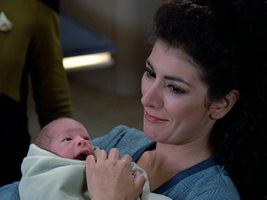
 "The Child"
"The Child"